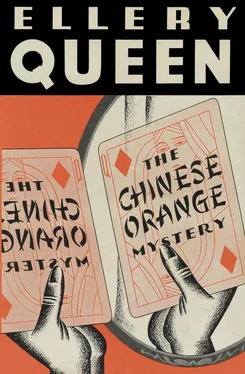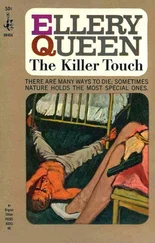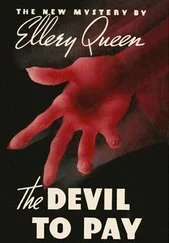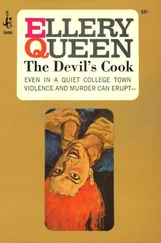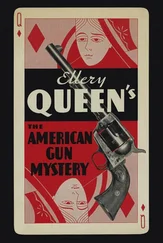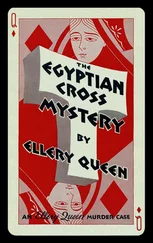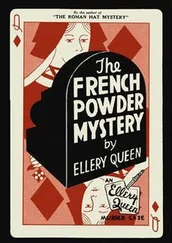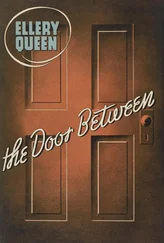“Heavens, no, Mr. Queen,” said the manager quickly. “They’re Mr. Kirk’s.”
“Stupid of me. Of course.” Ellery glanced at the wall above the fireplace. The African shield had been turned face to the wall. Four lines of lighter shade than the paint on the wall came out behind the inverted shield like the arms of an X. The spears had undoubtedly hung there, and the murderer had wrenched them from the wall.
“If I had any doubts about the nuttiness of this bird,” growled Brummer doggedly, “I’d lose ’em when I took a look at the furniture, Mr. Queen. You can’t get around that, can you? Only a lunatic would ’a’ tossed all this fine expensive stuff around this way. Now, what the hell for, I ask you? Everything’s cockeyed. There’s no rhyme or reason to it, as the feller says.”
“Brummer’s right,” said Nye with another groan. “This is the work of a madman.”
Ellery regarded the house detective with honest admiration. “Brummer, you’ve placed that horny finger of yours on the precise point. Rhyme and reason. Exactly.” He began to pace up and down. “That’s exactly it. It stuck in my craw from the moment I walked onto this fantastic scene. Rhyme!” He snatched off his pince-nez and waved them about, as if he were trying to convince himself more than Brummer and Nye. “Rhyme! There’s rhyme here that utterly defies analysis, that staggers the imagination. If there were no rhyme I should be pleased, very pleased. But rhyme — there’s so much of it, it’s so complete and so perfect, that I doubt whether there has ever been a more striking example of it in the whole history of logic!”
Nye looked bewildered. “Rhyme?” he echoed stupidly. “I don’t see what you mean.”
“You mean about the furniture, Mr. Queen?” asked Brummer, knitting his black brows painfully. “It just looks all — well, all messed up to me. Some nut went to a hell of a lot of trouble to wreck this room. I don’t see—”
“Oh, heavens,” exclaimed Ellery, “you’re blind, both of you. What do you mean, Brummer, by ‘messed up’?”
“You can see, can’t you? Knocked around, shoved out of place.”
“Is that all? Lord! You don’t see anything broken, do you? Smashed? Demolished?”
Brummer coughed. “Well, no, sir.”
“Of course you don’t! Because this wasn’t the work of a wrecker. It was the work of some one with a cold purpose, man, with a purpose worlds removed from mere stupid destruction. Don’t you see that yet, Brummer?”
The detective looked miserable. “No, sir.”
Ellery sighed and replaced his glasses upon his thin nose. “In a way,” he muttered half to himself, “this becomes valuable exercise. Lord knows I need... Look here, Brummer, old fellow. Tell me what you see about the bookcases that strikes you as — ah — ‘messed up.’”
“Bookcases?” The house detective regarded them doubtfully. They were sectional cases of unfinished oak; the odd thing about them was that they stood, for the most part neatly, arrayed on all three walls with their closed backs facing into the room. “Why, they’re turned around to face the walls, Mr. Queen.”
“Admirable, Brummer. Including,” Ellery frowned in a puzzled way, “the two sections flanking the doorway to the office there; although I note with baffled interest that the section to the left of the door has been pulled in front of the door and turned on an acute angle into the room for a bit. And that the one to the right has been shoved off to the right. Well! How about the rug?”
“It’s been turned over, Mr. Queen.”
“Precisely. You’re gazing at the back. And the pictures on the walls?”
Brummer’s face was brick-red now, and his reply came in a sullen mutter. “What you drivin’ at, anyway?”
“Any notion, Mr. Nye?” drawled Ellery.
The manager raised his padded shoulders. “I’m afraid I’m not very good at this sort of thing, Mr. Queen,” he said in a soupy voice. “All I can concentrate on right now is the terrible scandal, the notoriety, the — the—”
“Hmm. Well, Brummer, since this has turned out to be a demonstration, let me expound the gospel of Rhyme.” He took out a cigaret and lit it thoughtfully. “The bookcases have been turned around to face the wall. The pictures have been turned around to face the wall. The rug on the floor has been flipped over to lie face down. The table, which has a drawer — you can see that by the two cracks at the back — has been turned around to face the wall. That grandfather clock over there has been turned around to face the wall. These very comfortable chairs have been turned around so that the backs are forward and the seats face the wall. That floor-lamp of the bridge variety has been turned around so that the shade faces the wall. The large lamp and the two table lamps have been turned upside down to rest precariously upon their shades and to wave their nude bases in the air. Turned around, turned around!” He puffed a sharp billow of smoke at the detective. “Well, Brummer, what do these make in toto ? Put them all together and they spell what?”
Brummer glared, baffled.
“Rhyme, Brummer, rhyme! Rhyme of the couplet variety. There’s a monotonous regularity about this rhyme that simply astounds me. Don’t you see that not only have the dead man’s clothes been removed and replaced on his body backwards, but that the furniture and everything else of a movable nature in this room have also been turned backwards ?”
The two men gaped at him.
“By God, Mr. Queen,” cried Brummer, “you’ve hit it on the snoot!”
“By God, Mr. Brummer,” said Ellery grimly, “there’s rhyme here that will write detectival history when this case is solved — if it ever is. Everything is backwards! Everything. Not just one movable object, mind you, or two or three, but everything. There’s your rhyme. But how,” he muttered, beginning to stride about again, “how about the reason ? Why should everything have been turned backwards? What is it intended to convey, if it’s intended to convey anything at all? Why, Brummer; eh?”
“I don’t know,” said the detective in a hushed voice. “I don’t know, Mr. Queen.”
Ellery paused in his stride to stare at him. Nye slumped against the door in an attitude of complete befuddlement. “Nor do I, Brummer,” said Ellery from behind clenched teeth, “yet.”
Inspector Queen was a little bird of a man — a gray-plumed and rather aged bird with a bird’s uncanny unwinking eyes and a stiff gray mustache under a small beak that might have been chiselled out of horn. He possessed, too, something of the bird’s capacity for freezing into stone when the occasion called for immobility, and a quick pattering gait like the hop of a bird when action was demanded. And at those times when he stepped out of character and did not growl, he even cheeped. Large red men had been known to quail at his gentlest chirp, however, since there was something formidable about the old gentleman’s very birdliness, as it were; so that the detectives under his wing feared as well as loved him.
Now they feared far more than they loved, for his chirp had a harsh crackle in it that bespoke irritation. It was all very well for the due process of a murder investigation to be under way, with his men running over the room like a pack of sniffing dogs; but the annoying puzzle of the crime that was backwards kept staring him disagreeably in the face. He felt an unaccustomed futility.
He directed operations absently, from long habit; and all the while the fingerprint detail were spraying the room, the official photographer was snapping the body and the furniture and the door, Assistant Medical Examiner Prouty was kneeling beside the dead man, and the homicide men under Sergeant Velie were gathering names and statements, the old gentleman was wondering how on earth a mere cop could be expected to find plausible reasons for the shockingly implausible phenomena of this murder-case. He was too cautious to dismiss without reflection the topsy-turvy nature of the clues as purposeless vagaries of an insane mind. But what else was a man to think?
Читать дальше
